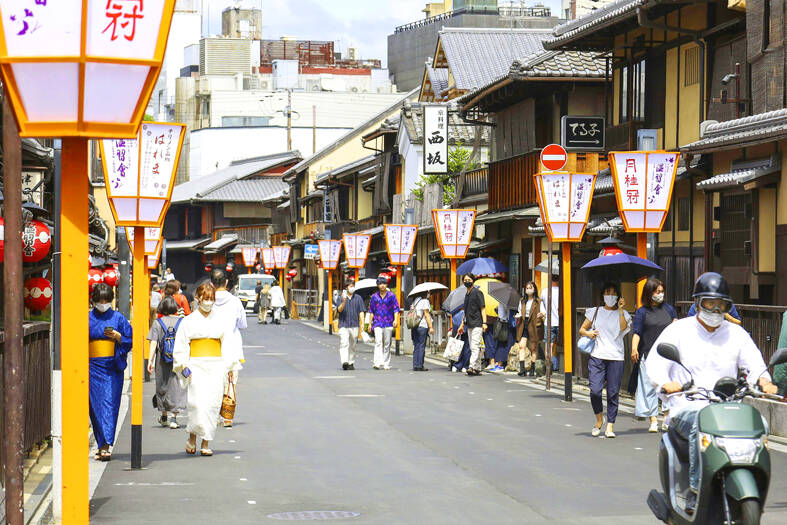Japan’s ancient capital of Kyoto, long a popular destination for tourists, is closing off some private-property alleys in its famous geisha district because of complaints about misbehaving visitors.
Tourists crowd the narrow, quaint streets of Gion District, often following tour guides who show people around and lecture for long hours, Isokazu Ota, the area’s representative secretary to the city’s South Side District Council, said on Friday.
“We are going to put up signs in April that tell tourists to stay out of our private streets,” he said.

Photo: Kyodo News via AP
“We don’t want to do this, but we’re desperate,” he added.
A sign is to say in Japanese and English that “this is a private road, so you are not allowed to drive through it,” although the keep-out warning is aimed mainly at pedestrians, not vehicles.
It would also warn of a ¥10,000 (US$68) fine.
The ban covers just several blocks of Gion. The district’s public streets would remain open to tourists, so the area and the rest of Kyoto would still be teeming with visitors, from Japan and around the world.
Gion’s outrage highlights brewing resentment at what many people feel is “over-tourism,” even though the Japanese economy depends more than ever on tourism revenue to sustain growth.
The district of winding alleyways — known for picturesque teahouses, where geisha and their maiko apprentices, wearing fancy kimono and hair ornaments, perform in dance and music — is regularly targeted by smartphone-wielding visitors, some of whom ignore signs requesting that they keep their distance and refrain from touching the women’s expensive kimonos.
There have also been complaints about people trespassing on private property.
Complaints about overzealous tourists began bubbling years ago, although the discontent cooled when the COVID-19 pandemic brought a lull in tourism. Now, visitors are back with a frenzy. In December last year, the council urged the city’s government to take action against unruly tourists, complaining that their neighborhood was “not a theme park.”
Ota said that some visitors behave like amateur paparazzi when they spot a geisha walking along narrow streets, some of which are just 2m wide.
The number of foreign visitors soared 79.5 percent in January from a year earlier to about 2.69 million, reaching levels seen in the same month in 2019.
The largest number of travelers came from South Korea, followed by those from Taiwan and China, Kyodo News said.
Additional reporting by The Guardian

BRUSHED OFF: An ambassador to Australia previously said that Beijing does not see a reason to apologize for its naval exercises and military maneuvers in international areas China set off alarm bells in New Zealand when it dispatched powerful warships on unprecedented missions in the South Pacific without explanation, military documents showed. Beijing has spent years expanding its reach in the southern Pacific Ocean, courting island nations with new hospitals, freshly paved roads and generous offers of climate aid. However, these diplomatic efforts have increasingly been accompanied by more overt displays of military power. Three Chinese warships sailed the Tasman Sea between Australia and New Zealand in February, the first time such a task group had been sighted in those waters. “We have never seen vessels with this capability

A Japanese city would urge all smartphone users to limit screen time to two hours a day outside work or school under a proposed ordinance that includes no penalties. The limit — which would be recommended for all residents in Toyoake City — would not be binding and there would be no penalties incurred for higher usage, the draft ordinance showed. The proposal aims “to prevent excessive use of devices causing physical and mental health issues... including sleep problems,” Mayor Masafumi Koki said yesterday. The draft urges elementary-school students to avoid smartphones after 9pm, and junior-high students and older are advised not

Philippine President Ferdinand Marcos Jr has fired his national police chief, who gained attention for leading the separate arrests of former Philippine president Rodrigo Duterte on orders of the International Criminal Court and televangelist Apollo Carreon Quiboloy, who is on the FBI’s most-wanted list for alleged child sex trafficking. Philippine Executive Secretary Lucas Bersamin did not cite a reason for the removal of General Nicolas Torre as head of the 232,000-member national police force, a position he was appointed to by Marcos in May and which he would have held until 2027. He was replaced by another senior police general, Jose

POWER CONFLICT: The US president threatened to deploy National Guards in Baltimore. US media reports said he is also planning to station troops in Chicago US President Donald Trump on Sunday threatened to deploy National Guard troops to yet another Democratic stronghold, the Maryland city of Baltimore, as he seeks to expand his crackdown on crime and immigration. The Republican’s latest online rant about an “out of control, crime-ridden” city comes as Democratic state leaders — including Maryland Governor Wes Moore — line up to berate Trump on a high-profile political stage. Trump this month deployed the National Guard to the streets of Washington, in a widely criticized show of force the president said amounts to a federal takeover of US capital policing. The Guard began carrying